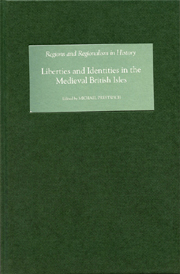Book contents
- Frontmatter
- Contents
- List of maps
- Abbreviations
- Introduction
- 1 States, liberties and communities in medieval Britain and Ireland (c.1100–1400)
- 2 Arbitration and Anglo-Scottish border law in the later middle ages
- 3 Peacekeepers and lawbreakers in medieval Northumberland, c.1200–c.1500
- 4 War, lordship, and community in the liberty of Norhamshire
- 5 The lordship of Richmond in the later middle ages
- 6 ‘Tam infra libertates quam extra’: Liberties and military recruitment
- 7 Neighbours from Hell? Living with Tynedale and Redesdale, 1489–1547
- 8 Striving for Marcher liberties: The Corbets of Caus in the thirteenth century
- 9 Franchises north of the border: Baronies and regalities in medieval Scotland
- 10 The liberties of Ireland in the reign of Edward I
- Index
Introduction
Published online by Cambridge University Press: 12 September 2012
- Frontmatter
- Contents
- List of maps
- Abbreviations
- Introduction
- 1 States, liberties and communities in medieval Britain and Ireland (c.1100–1400)
- 2 Arbitration and Anglo-Scottish border law in the later middle ages
- 3 Peacekeepers and lawbreakers in medieval Northumberland, c.1200–c.1500
- 4 War, lordship, and community in the liberty of Norhamshire
- 5 The lordship of Richmond in the later middle ages
- 6 ‘Tam infra libertates quam extra’: Liberties and military recruitment
- 7 Neighbours from Hell? Living with Tynedale and Redesdale, 1489–1547
- 8 Striving for Marcher liberties: The Corbets of Caus in the thirteenth century
- 9 Franchises north of the border: Baronies and regalities in medieval Scotland
- 10 The liberties of Ireland in the reign of Edward I
- Index
Summary
This volume is the product of a colloquium held at the University of Durham, as part of a research project on the liberties of north-east England in the medieval period. The project was generously funded by the Leverhulme Trust, whose assistance is gratefully acknowledged. The aim of the colloquium was to bring together scholars working in a British, rather than purely English, context, and to provide a wide perspective on the complex issues of the liberties and franchises that were such a significant part of the political, administrative and legal landscape of later medieval Britain.
Liberties have received surprisingly little attention in recent years. Helen Cam's seminal studies were followed up by D.W. Sutherland with a masterly examination of Edward I's challenge to the liberties in his quo warranto enquiries. Legal issues dominate discussion; Naomi Hurnard's sharp legal-historical mind bore down acutely on the subject. Much more recently, work has been done on liberties before and after the period with which this volume is largely concerned. The Anglo-Saxon antecedents of liberties have been examined in an article by Julia Crick; the rhetoric of liberty in the pre-Conquest period meant something very different from the defined rights of later years. In important studies Tim Thornton has examined the liberties of the late medieval and Tudor periods, notably those of Cheshire and Durham. The Welsh March, with its complex amalgam of English and Welsh customs, was the subject of masterly analysis by R.R. Davies in a classic work; the importance of these liberties has never been neglected.
- Type
- Chapter
- Information
- Publisher: Boydell & BrewerPrint publication year: 2008



